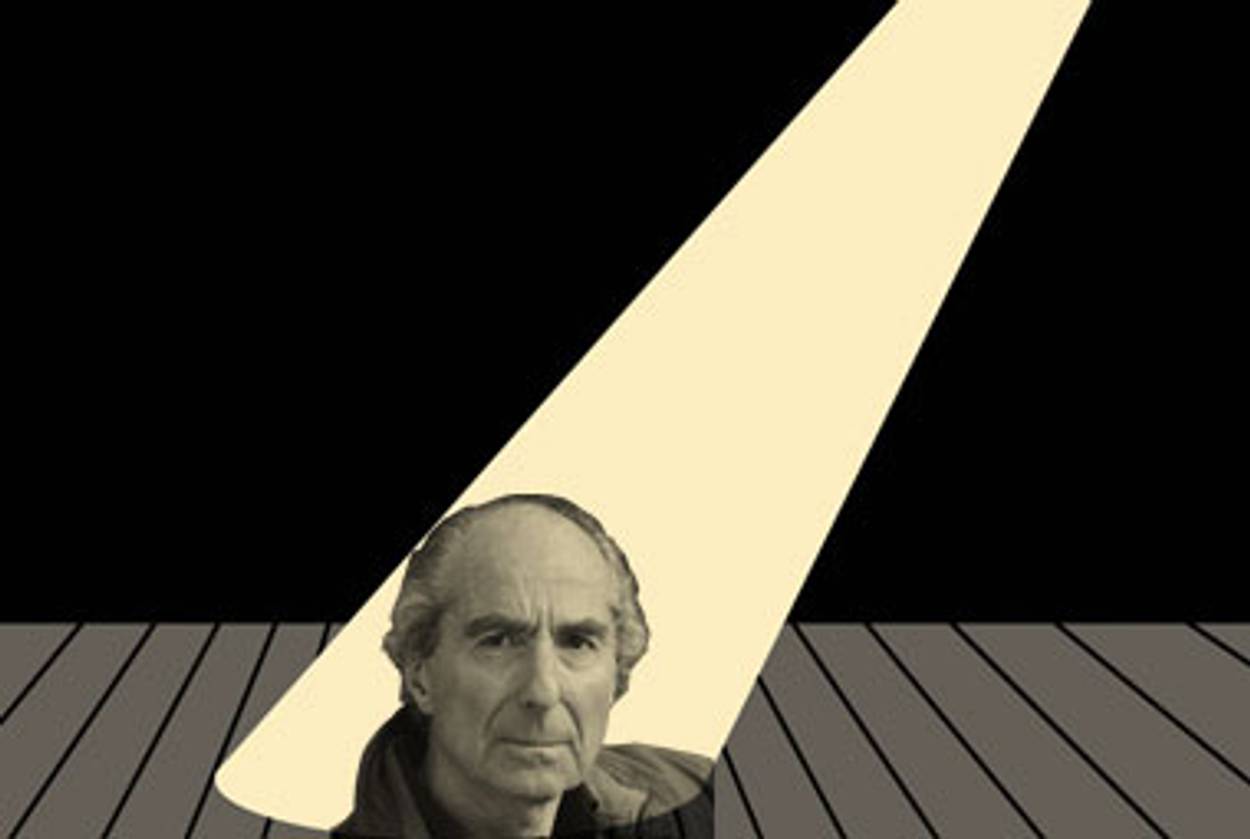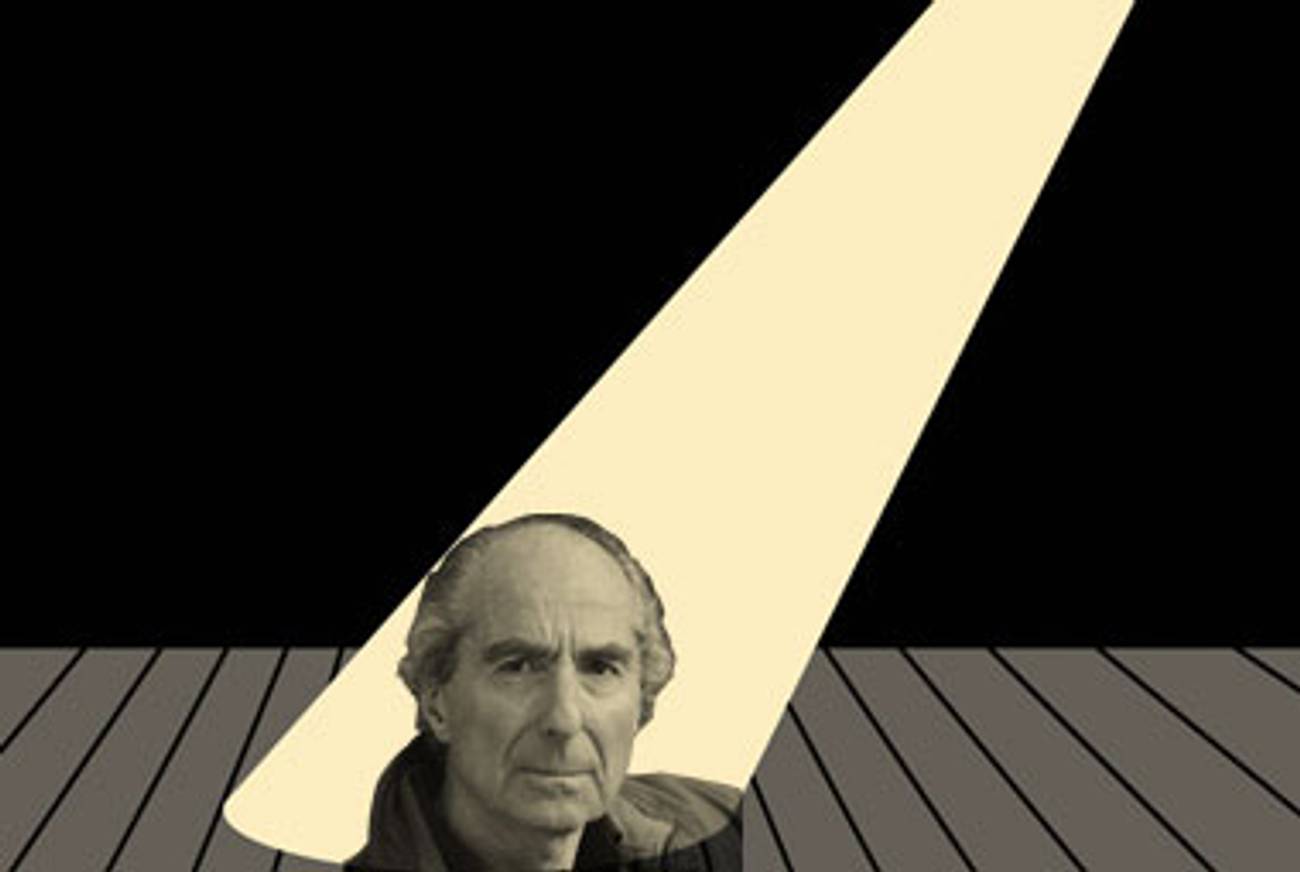Upstaged
In ‘The Humbling,’ Philip Roth imagines an actor grappling with the waning of his gifts




In the mid-1990s, Philip Roth entered the triumphant late phase of his long career, producing a series of big historical novels—American Pastoral, I Married a Communist, The Human Stain. These books, with their detailed recreation of the American past and their blend of social observation with Rothian obsession—about sex, death, and the Jews—showed that he had not lost his ability to surprise. They were as different from Roth’s postmodern metafictions (The Counterlife, Operation Shylock) as those books were from his profane early comedies (Portnoy’s Complaint, Goodbye Columbus) or his confessional Zuckerman novels (The Ghost Writer, The Anatomy Lesson).
Few writers in their mid-60s have the ambition, not to mention the stamina, for the kind of self-reinvention Roth undertook 15 years ago. But late Roth, it turns out, was not the last disguise the shapeshifter would assume. That phase, it is now clear, came to an end in 2004, with the publication of The Plot Against America, the last of Roth’s large, backward-looking novels. The books he has produced since then, as he entered his 70s, can only be called late late Roth—or better still, endgame Roth, since they are a series of meditations on last things. In Everyman and Indignation, Roth’s protagonists are actually dead, looking back on their lives from beyond the grave. In Exit Ghost, his alter ego Nathan Zuckerman is impotent, which for a Rothian hero is a fate worse than death.
Now comes The Humbling, the latest installment in this wan series. The title could have been used for any of those three books, especially Exit Ghost, for Roth is once again dwelling on impotence—in this case, not just sexual but artistic, too. “He’d lost his magic. The impulse was spent,” read the first lines of the book, and they tell us everything we need to know—in fact, just about everything we ever learn—about Simon Axler, Roth’s latest avatar. Just as Saul Bellow used to make his alter egos professors or journalists, but wrote about them as if they were really novelists—that is, as if they were himself—so Roth makes Axler an actor, a calling that can easily be translated back into its writerly original.
Axler, like Roth, is a world-renowned artist entering old age; like Roth (and like E.I. Lonoff, the writer-recluse of The Ghost Writer), he lives in almost total seclusion in a farmhouse in the Berkshires. But Axler has also lost his talent and confidence, which can hardly be said of a novelist who continues to publish a book a year. Or can it? Certainly Roth has not suffered any conspicuous, demoralizing failure, as Axler did when “he was asked to play Prospero and Macbeth at the Kennedy Center—it was hard to think of a more ambitious double bill—and he failed appallingly in both.” This debacle, coming after a series of bad performances, drove Axler from the stage, and even brought on thoughts of suicide. Very early in The Humbling, when Axler’s wife leaves him, he comes so close to pulling the trigger that he checks himself into a mental hospital.
Axler’s artistic humbling may not reflect Roth’s experience. But whatever power and interest The Humbling possesses comes from the reader’s sense that it does reflect Roth’s apprehensions. After all, Roth is too unsparing a writer not to realize that The Humbling, like its predecessors, represents a dramatic shrinking of his fiction’s power and scope. The book is very short—a novella at most—and thinly imagined, with few surprises in plot or language. Roth’s characteristic rant—the vengeful, self-justifying, exhilarating speeches in which his characters define their anger and appetite—has shrunken, here, to Axler’s repetitive querulousness:
What was he doing in this hospital room? A self-travesty had come into being who did not exist before, a self-travesty grounded in nothing, and he was that self-travesty, and how had it happened? Was it purely the passage of time bringing on decay and collapse? Was it a manifestation of aging?
The one element of wildness, of transgressive energy, to be found in The Humbling is, ironically, the most ordinary of all, coming from Philip Roth: sex. The book’s first section, “Into Thin Air,” ends with Axler refusing his agent’s offer of a role in a Eugene O’Neill play. He has come to terms with his loss of talent and, at the standard retirement age of 65, resigns himself to a futureless future. “Something fundamental has vanished. Maybe it had to. Things go,” he ruminates. But the next section is titled “The Transformation,” and it shows Axler suddenly reinvigorated by a challenge even greater than O’Neill.
That challenge is Pegeen Mike Stapleford, a 40-year-old woman he has known since she was born. She is the daughter of two old friends of Axler’s, fellow actors who never made it big; she was named after a character from Playboy of the Western World, in which all three of them were playing when she was born. If the title of the Synge play seems like a prophecy of Axler’s imperial libido, Pegeen Mike’s bisexual name is a symbol of her lesbianism. Yet, in what cannot help reading like a parodically macho Rothian development, no sooner does Pegeen show up at Axler’s house than she falls in love with him and decides to become straight.
“It had been some time since she’d had what she wanted rather than its grotesque inversion,” Roth writes, and Axler goes about inverting her inversion with a complacency that I imagine almost any reader under 40 will find absurd, if not offensive. (“Then he led her to the sofa in the living room, where, blushing furiously as he watched her, she undid her jeans and was with a man for the first time since college.”) Like Jimmy Stewart with Kim Novak in Vertigo, Axler buys Pegeen new clothes and gets her hair cut, making her into the woman of his dreams: “In the New York stores, after trying on something new in the dressing room, she’d come out to where he was waiting for her to show him how it looked and to hear what he thought.”
But if Axler remembered the Hitchcockian parallel, he’d know that this kind of egoism does not go unpunished. “Converting” Pegeen, Roth allows us to see, is the great challenge and gamble of Axler’s late life: if he has the charisma and potency to turn her straight, then he might no longer be the wreck we met in the first pages of the novel. He begins to dream about returning to the stage, and even of having a child. But in the savage sexual warfare of Roth’s world, there is nothing more dangerous for a man than to put so much of his self-worth in a woman’s hands: “Eventually a day will come, Axler thought, when circumstances render her in a much stronger position for it to end, whereas I will have wound up in a weaker position merely from having been too indecisive to cut it off now. And when she is strong and I am weak, the blow that’s dealt will be unbearable.”
The title of the The Humbling leaves no doubt that the blow is coming. We can see an image of Axler’s future in Louise, Pegeen’s last lover, whose jilting has turned her into an obsessive, jealous wreck. And Axler seems to be tempting fate by introducing women—first a fantasy, then a real one—into his lovemaking with Pegeen, in passages that allow Roth to show that his boldness in writing about sex has not deserted him. (By far the most memorable scene in the book involves Pegeen’s green strap-on dildo.)
In The Humbling, as in Exit Ghost, Roth does not indulge his hero’s dreams of being young and potent again: as Philip Larkin wrote, we all know what “the only end of age” must be. It is only this remorselessness that rescues The Humbling from its undoubted limitations; that, and the fascination of watching a writer who has written so well, for so long, negotiate with a certain dignity the equally remorseless humbling of his own gifts.
Adam Kirsch is a contributing editor to Tablet Magazine and the author of Benjamin Disraeli, a biography in the Nextbook Press Jewish Encounters book series.
Adam Kirsch is a poet and literary critic, whose books include The People and the Books: 18 Classics of Jewish Literature.
Adam Kirsch is a poet and literary critic, whose books include The People and the Books: 18 Classics of Jewish Literature.